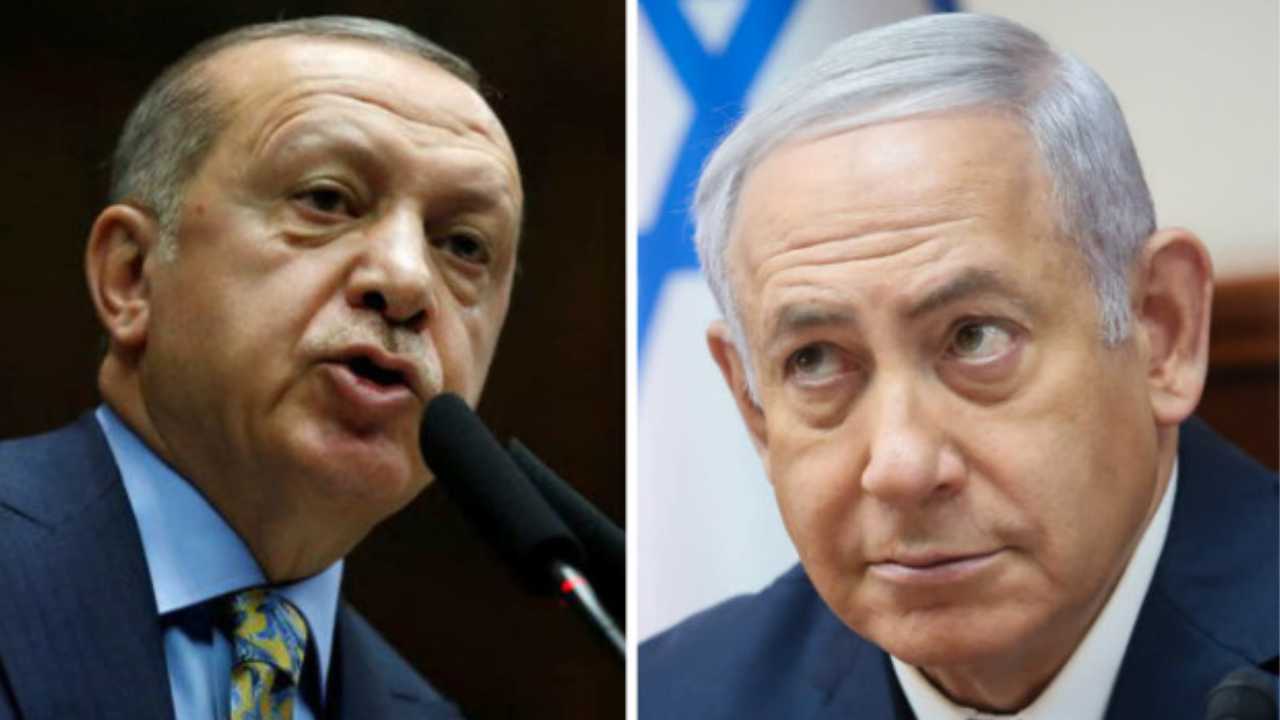
Publication
Erdogan attacks Netanyahu again

ARVAK Center comment, 28.04.2024
Turkish President Recep Tayyip Erdogan has once again intensified his rhetoric against Israel and its leadership. Speaking at the 5th Conference of the Inter-Parliamentary Jerusalem Platform in Istanbul on 26.04.2024, the Turkish leader spoke in the harshest possible terms about the crimes of the “Zionist regime” in Gaza, qualifying them as genocide and assuring the audience that Ankara has stopped all trade ties with Israel.
Erdogan supplemented his emotional speech with another attack on Netanyahu, not changing his preferred method of resorting to personal insults against his opponents: “Hey, Netanyahu, my prayer is: “O Allah, manifest Your name Almighty and destroy these Zionists, starting with Netanyahu”. Even if some people back down, we won’t give up ways [of supporting Palestine] because we believe in Allah and the Day of Judgment”.
At the outset, it should be noted that Erdogan’s radical rhetoric regarding the events in Gaza should not, as before, be considered in line with Turkey’s practical behavior. Erdogan has repeatedly stated that Ankara has stopped all financial and economic transactions with Israel. However, just a month ago, the Turkish Ministry of Trade published a list of some 40 items that are banned from export to Israel. This clearly indicates that the nomenclature of the goods that were not on the list, a priori, do not fall under the sanctions of the Turkish state. In addition, there is a lot of indirect evidence that Ankara is not indifferent to the practice of using “gray schemes” in trade with Israel, which involves the sale of goods to Tel Aviv through intermediary countries, as well as the re-export of other sides’ products to the Jewish state. In this regard, it is noteworthy that the Turkish Trade Ministry’s list of banned goods included fuel (gasoline, diesel), but did not mention crude oil. Meanwhile, Azerbaijani oil continues to be pumped by Baku–Tbilisi–Ceyhan pipeline to the Turkish terminals, from where it is delivered by tankers to Israeli refineries. Azerbaijan’s formal ownership of this oil in no way justifies Turkey’s intermediary activities. It should be remembered that this is a strategic raw material that allows Israeli tanks, bulldozers, and planes to carry out active combat operations in Gaza.
Furthermore, Erdogan’s anti-Israeli rhetoric is deeply dissonant with information that Ankara will deploy in northern Iraq its divisions of S-400 Triumf anti-aircraft systems purchased from Russia. According to analysts, if this information is true, there is no doubt that the Russian systems appear there to track and intercept Iranian ballistic missiles fired at Israel.
All these data once again show that Erdogan continues to adhere to the following formula of action on the “Israeli track”: “The deeper the practical engagement with Israel, the harsher the ‘anti-Zionist rhetoric’”. In addition, there are several other factors behind the new wave of accusations against Israel.
First, the AKP has been defeated in Turkey’s midterm elections. Erdogan’s party has lost a significant part of its conservative electorate – those segments of the Turkish society that are attracted to the idea of greater solidarity with the Islamic world against the backdrop of the West’s de facto support for the Palestinian massacre. On the eve of the expected transition of power, it is extremely important for Erdogan to bring this part of the society back into the orbit of his political-ideological worldview.
Another factor is the winding down of the U.S. military and political presence in Iraq and, to some extent, in Syria. The activation of Turkish policy towards Iraq and the creation of a comprehensive political and economic platform of interaction and rapprochement between Ankara and Baghdad are linked to these events. Erdogan’s “Iraq portfolio” obliges him to further radicalize his public stance towards Tel Aviv, given the Arab republic’s multifaceted palette of political forces, various paramilitary groups and sectarian communities, whose relative loyalty to Ankara will be largely determined by the degree of its relationship with the hostile “Zionist regime”.
Unlike Libya and Syria, this time Turkey must demonstrate its fundamental rejection of the US-Israeli policy in the Middle East by entering one of the key countries of the Arab world not as an aggressor but as a “friend”. Perhaps one of the demonstrative actions in favor of Arab sympathies was Erdogan’s cancellation of his planned visit to the U.S. on May 9 this year. Erdogan can afford himself not to meet with the “lame duck” Biden for the time being, waiting for the American elections and at the same time demonstrating his alleged rejection of the US-Israeli alliance policy.
